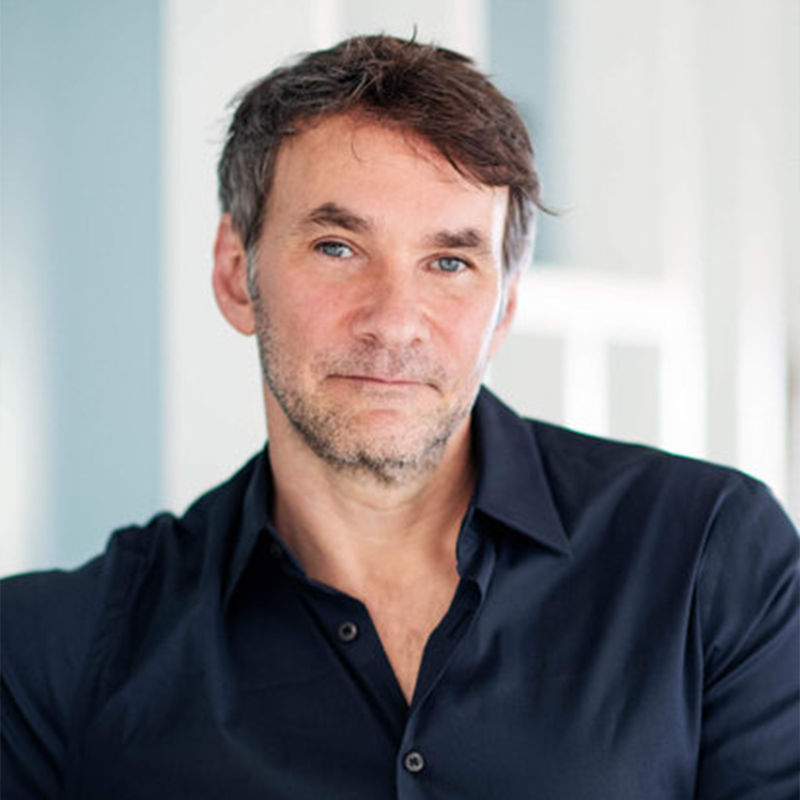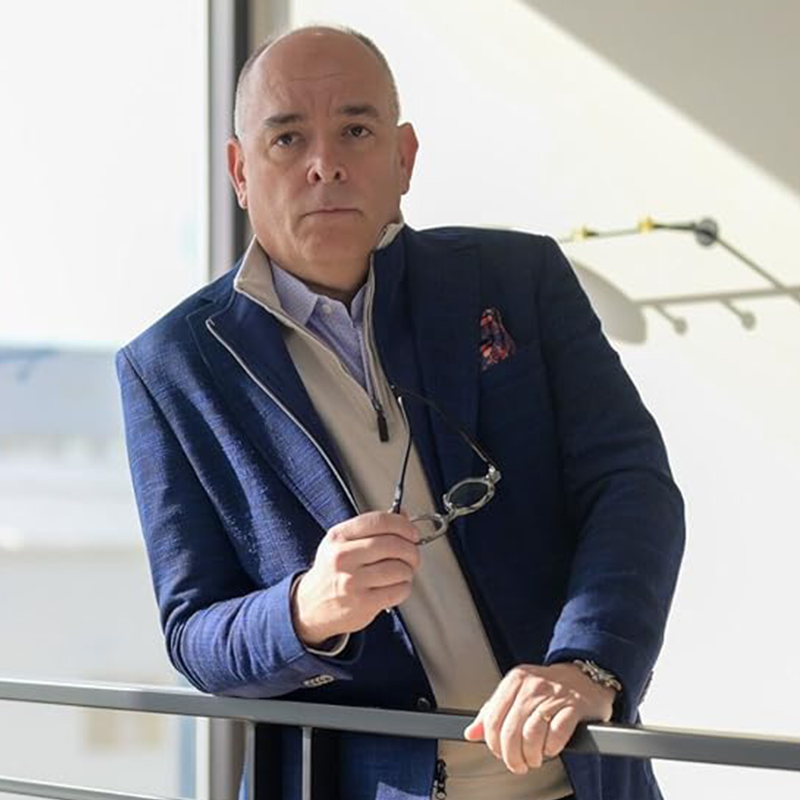RV: (00:06) Hey brand builder, Rory Vaden here. Thank you so much for tuning in to listen to this interview. We are so excited to bring you this information and wanted to let you know that, Hey, there’s no sales pitch coming from anything that we do with this is all our value add to you and the community. However, if you are somebody who is looking for specific strategies on how to build and monetize your personal brand, we would love to talk to you and we offer a free call to everyone that’s interested in getting to know us and is willing to give us a chance to get to know them and share a little bit about what we do. So if you’re interested in taking us up on a free strategy call, you can do that at brand builders, group.com/summit call brand builders, group.com/summit. Call to talk to you soon on with the show. RV: (01:03) So you are about to learn how to book over a hundred keynotes a year in the next 20 minutes. So Josh Linkner, uh, is I think the epitome of just a thought leader and an expert. He’s really the world’s foremost expert on innovation, both in academic from an academic standpoint, but also from an experiential standpoint. So you know, that we’re all about practitioners. So first of all, he has had five he’s, a five-time tech entrepreneur. There’s a combined exit value of over $200 million. And he also won the Ernst and young entrepreneur of the year twice, which is insane. That’s like winning two Nobel prizes in the world of entrepreneurship. And then on the thought leader side, he speaks over a hundred, uh, for over a hundred paid engagements. Every single year he is doing, he’s got three books, he’s a New York times bestselling author of three books. RV: (02:03) He writes for Forbes and inc. And just like, literally, if someone is booking an innovation speaker, they will eventually book Josh. Like it’s just a matter of time. So he’s here to share all of his secrets for us and tell us how that works and how in the heck he pulls that off. So buddy, thank you for being here. Truly a pleasure and an honor to join. Thank you. So how do you book a hundred keynotes here? Like what is it, is it, do you think in all seriousness, do you think it is a, is it a combination of a thousand little things or is it a few big things? Yeah. Well, first of all, not everybody wants to do that and I think you are pursuing speaking, you know, there’s no right or wrong. My record, I would think we were chatting earlier as 163, but someone might not want to do that. So please don’t feel obligated anybody, but I’m happy to show what we do. You know, Roy, I think it’s a lot of little things we spent over a decade dissecting JL: (03:00) The speaking industry and understanding how do people set fee? How do you create demand? How do you interact with bureaus? And I wish I could say there was one silver bullet thing, but it’s, it’s the intersection of being a strong thought leader being good on stage, certainly, but also really developing your brand. And I know you guys are the world’s expert at that in a way that the market understands and is willing to buy. And one thing is funny, you know, in my previous business I had about 500 people and 100 of them were in sales. So we had a massive sales organization. We don’t, we’re not, there was a hunting business with hunting down clients and we were able to win 74 of the top 100 brands. The speaking industry, in my opinion, is a fishing business. So it’s more it’s I don’t think you’re going to get a lot of success getting on the phone and cold calling meeting planners. But if you have the right SEO strategy, your website’s gorgeous, your marketing is cohesive and understandable. Your value proposition is clear. It’s about casting, tons of lines in the water and making them irresistible. And ultimately you’re going to get, you know, plenty of activity, RV: (03:59) Man. I love that. That’s such a good distinction between kind of the two and that’s the world that we came from. Also, we used to our old business was training salespeople, how to sell, like training them, how to hunt and then brand builders is basically, you know, how to fish. It’s like how to, how to make people come to you. So, um, you know, and I like to, I like the way you’re talking and thinking about that between like being a thought leader, um, and being great on stage and then really developing your brand. So let’s tackle those. Uh, so let’s talk about the thought leader part first. One of the jokes that I have around brand builders group is I tell people, I say, hopefully at least half of what we teach you is real substance because I, you know, I really think, you know, there is a, it really should be thought. Leader has a lot of depth and it should be about experience and education, but fortunately, or unfortunately it does seem like marketing and perception matters a lot. So how do you think you really become a true thought leader and what is the balance between the like, you know, I actually am an expert and I’m marketing as an expert and I’m doing things to, to position myself as an expert. JL: (05:19) The way I think about it is I think that if you’re a speaker specifically, you’re really running three interchange, interconnected businesses at one time, and let’s think about them separately for a second. One is a thought leadership business where you are truly an expert in your field. The second is a brand marketing distribution business on how do you actually sell yourself as a speaker and a thought leader? And the third one is that of a performing artist, being a great storyteller, being terrific on stage, et cetera, you really need all three of those firing on all cylinders to be successful. You can only get so far if you only have a little bit in each of those categories. So the first thing I would do, Rory is dissect separate those two, marketing yourself as a thought leader is different than being a thought leader. So going deeper on being a thought leader world, as you likely know, craves deep expertise. JL: (06:08) In one thing, you know, I’ve had the chance I’ve hired 10,000 people over the last 30 years, I could, I’ve raised hundreds of millions of dollars of capital. So I could probably talk about hiring practices. I could probably talk about deployment of capital and financial rigor and a bunch of other stuff, but I don’t. I talk about one thing, which is my core passion for 40 plus years, which is the deployment of human creativity to drive productive outcomes, AK innovation. So if I tried to speak on a lot of things where even if I’m semi qualified in many of those, uh, my entire business would collapse. So the first thing I would recommend people do is get super, super deep in one thing and be known for it. If your one thing is customer service being the most profoundly expert world beater in that particular thing. JL: (06:53) So instead of being, you know, really wide and an inch deep go go seven miles deep and a, you know, a millimeter wide. And to do that, I think it’s all about, you know, constantly learning, constantly reading. You should know everything there is to know in your field, read every book there is on the topic, study the masters, watch every podcast, watch every Ted talk, follow every other thought leader, you know, really go deep as an expert in your field. And that again, when you think about these three concentric businesses that enter intersect, um, the first thing you gotta do is get really smart in your area of expertise. But beyond that, I think that, so that would be to be an extra. RV: (07:28) Okay. So hold on. Okay, go ahead. Go ahead. Go ahead. JL: (07:30) One last point, first thing to do is be, be an expert, but to be a thought leader, then you have to have a point of view. You have to ideally reveal something surprising and different and show leadership in the field. Not only expertise, RV: (07:42) Love that. Okay. So almost everyone we talked to has that same advice. I mean our entire phase one event is all about helping people figure out what is their one thing like that entire experience is really just taking them through a series of exercises to help them figure that out. And I liked the, I liked the term that you used, that you are a semi qualified to teach a lot of things. Cause I think most of us are semi qualified to teach a lot of things. How do you, what is your advice to someone who is struggling between the, you know, four or five, uh, you know, different things? JL: (08:23) Well, ideally it’s the one that you feel you’re most passionate about that you have the deepest level of expertise in. And, um, the other thing that you want to look at is, is marketability. So if I was really, really passionate, which I am by the way about jazz guitar, that was a good example. Good example. I could talk about out of play jazz guitar, but there’s not a big market for that on main stage keynotes. Um, on the other hand, my, my core topic innovation is a much more marketable thing. So the first person you want to look at, you know, where where’s your passion, where’s your deep expertise today. And then where does that intersect with market opportunity? And, and once you identify a broader lane of market opportunity like leadership or innovation customer service, then you also have to say, what, where can I add my own unique twist or unique flavor? So instead of being the, you know, one of a thousand leadership speakers or 10,000 leadership speakers, why are you one of a kind and in your particular flavor of, of that broader topic? RV: (09:16) Got it. Yeah, I like that. So JL: (09:19) One, one person that we work with it, you know, he was a really smart guy, wrote a book. He spoke on leadership and his principles were awesome, but they were really generic. And as you know, generic doesn’t really sell. So we started working with them and learn that he also was really into comedy. He actually performed comedy at second city years ago. So we said, well, what’s the intersection of comedy and leadership. And we went through a lot of work. We teased out Saturday night live. So he then said, wow, what if I became the guy that showed leadership lessons from Saturday night live because it’s this awesome organization that reinvents itself every week and has got talent that it keeps developing a lot of really cool metaphors. So then he went super deep on the research on SNL. He interviewed cast members and studied and read everything there was about it. He became expert at the intersection of leadership and comedy Saturday night live. So in that case now we’ve found something deeply compelling and unique and can’t be ignored and doesn’t blend into everything else. RV: (10:13) Yeah. I mean, that’s, uh, almost like thinking about a painter, right? Where you like a painter pallet where you have like, okay leadership, but leadership with what else and mixing it together. It’s like the same color, but a new shade. Um, it’s kind of like, I think that’s really, really cool. And we talk about color and shade a lot, but we usually think about it more from a message perspective more than a topical area, but you’re kind of saying the same thing, which I’m really, really, I love that. I think that is that’s awesome. So, JL: (10:45) Um, can you talk about that? RV: (10:46) So the, the point of view part, I mean, that is kind of what you’re talking about here, but like how do you identify that, that unique point of view as you’re saying, or that unique perspective or that unique slant? So I guess in order to become an expert, I almost hear you saying, go read everything in my space, follow the stuff in my space, know it, and then it’s almost like I have to kind of add something on top of it. I need to add a layer to it. Or a uniqueness is the word that we would use from Larry Winget is a uniqueness, um, or this, you know, how do you identify the uniqueness? JL: (11:25) Well, eventually just like, so again, I should have said I’ve been playing jazz guitar for 40 years. I’m deeply passionate about the art form. And if you personally, you have to do, if you want to be a musician is you have to learn the craft, AKA build some expertise. So I have to have, what are the chords, what are the skills? How do you, how do you play a note, right? That’s the equivalent of basically being a, you know, an expert in your field, but then if all you do is play other people’s music, you’re a house band at the holiday Inn, you know, you’re, you’re not, you don’t have your own original voice or content. It’s those that take the expertise and then build upon it and develop their own message, their own voice. Those are the ones that, that, that, that become superstars. JL: (12:03) And so in our speaking world, if all you do is study other people and have no perspective of your own, that that’s going to be a limiting factor. Once you develop expertise, then the next step of saying, how do I interpret that in a unique and compelling way? What’s my individual point of view. Um, what I learned is that speakers who only recite cliches are gonna cap out at a certain level. But if you, if you’re the opposite, if you’re revealing surprising truths, if you’re sharing, uh, something to different than, or helping people see the world in a different and fresh way, that’s where the opportunity really lies. RV: (12:35) Um, I love that. Um, I think that that’s a great parallel of the it’s basically, are you playing cover tunes at the holiday Inn or are you packing out arenas? Like no one goes to a Garth Brooks concert to watch him play the Eagles. Like they go to watch him play his stuff. Um, that’s a really practical, practical parallel. So I love that. So that first business is the expertise. The second business is, um, the brand distribution. And so is that kind of like content distribution, like a media company? Is that it kind of the right vibe or what do you do? You know, explain what you mean by that second? JL: (13:15) Yeah. So the first business is thought leadership first, you know, part a building your expertise and then part B, having that in a unique point of view, second business that you’re running concurrently as is not immediate business. At least the way I would look at it. That’s, that’s sort of the business of being a speaker. It’s all the things that you do off stage such that you get onstage at higher volume and higher fee. So that’s your overall brand, which you guys help with. It’s your positioning. It’s how you interact with bureaus. It’s how you set your price point. It’s, it’s not the content, it’s not the delivery. It’s the business side of your teaching practice. RV: (13:49) So the, so the, the media component of that, like pushing out your content could, could maybe be part of, it’s kind of like a part of business. A speaking part thought leadership is like putting your, like you write for Ian. Can you write for Forbes and things like that, that you would, you would classify that as more of the thought leadership piece of your business. JL: (14:10) I would, you know, the lines start to blur, obviously, because when you put a piece out of content, which is thought leadership that obviously can drive activity, which is marketing, but I would look at the second component here of a speaking business. The business side of it is everything that you do to get on stage. So that’s, it could be paid marketing, it could be SEO, it could be Bureau relationships. It could be, um, content that’s driving activity. It could be social media marketing. So all the business side of your speaking practice, not the delivery, not the original content development, but the business side. And, uh, and that’s, that’s, um, I know you, you really help people with dramatically. Um, one thing, I don’t know if you’d like a tactic or not today, but we’ve developed a really simple formula of how to communicate your value to bureaus and planners. That seems to be working beautifully. Yeah. RV: (14:54) Uh, no, we, we don’t, we’re not interested in that. Let’s just skip past that. Cause we don’t want any tactic. No, of course he has share. We want to know. We want to know. JL: (15:03) Awesome. And so this has done through tons of mistakes, by the way, through ton. And then once we kind of figured this out, we field tested and on and on. So this is just, I know it’s a bit formulated, but if I were you as a, if someone wants to build their speaking business, communicate your, your elevator speech kind of like this, here’s the old way. What do you speak about answer? I speak about cybersecurity instead of just answering that question in terms of the, the, the general topic that you speak on. Here’s what we like. We like this, this three column approach. The first column is the burning problem that you solved. The second column is why you, why you’re the right person to solve it. And the third column is the transformation that you create. How is that audience different once they’ve embraced your teachings? JL: (15:47) So again, burning problem, why you, your credibility essentially, and then the transformation that you create. So instead of Roy saying, Hey, I speak on cybersecurity. I would say something like this. Now I help organizations that are deeply concerned and overwhelmed with the threats of security, both internal and external, and they’re deeply, uh, uh, frustrated. They’re unable to devote enough resources to serve in clients and building their company because they’re constantly playing defense. I’m going to go to the second column as somebody who’s written five books on cybersecurity and work with 49 of the top 50 big brands around the world and has a proven methodology to protect and insulate against cyber threats. That was my second column. Third column is now the transformation that I create, I would continue and say, I work with organizations to give them the confidence and creative freedom that they know that they are, their security threats have been mitigated, such that they can get on with the hard work of growing their business. And that was sloppy. I’m not a cybersecurity expert, but the notion is say what you do in that format, the problem that you solve, why you and the transformation you create. RV: (16:51) I love it. I love it. So on the business side of speaking, JL: (16:56) You know, you’ve, you’ve, you’ve built these successful companies in lots of different industries. That’s one of the RV: (17:01) Things I think is a big problem. Speakers have is they don’t treat their business like a business. They don’t invest into it. They don’t run it like a business. They don’t keep financial statements. They don’t do marketing, they don’t do sales like JL: (17:11) They don’t. So would you say that a lot of the principles of running a, any great business apply to running a great speaking business? Or do you say no? No. The speaking business is totally different. There are some unique elements to the speaking business, but I would lean on the first one that you got to run it like a business. Imagine if you ran a law firm, you’re like, yeah, I don’t really know. I just, people show up and maybe I send them a bill. Maybe not. I mean, the sloppiness that some speakers embraces is troubling. I think you’re exactly right. You don’t be really deliberate. What percentage of your revenue do you reinvest in marketing? How do you track leads and inbound opportunities? We have detailed dashboards and analytical models. We have throughput. I mean, we, we at it with the rigor of a software company and that’s been very, very helpful. JL: (17:52) Uh, and I, I would recommend people know, take that same approach, treat it seriously. Cause cause there really is a, is a wonderful opportunity. One thing real quickly to just say is that our research has indicated that the industry itself is really big, bigger than most people think there’s actually $4 billion of speeches bought and sold every year in North America alone. So the reason I’m happy sharing what we do is I don’t think it’s going to hurt my business. There’s a massive opportunity out there now. It doesn’t mean you can be half ass about it. You have to be good. You have to treat your business seriously. But if people who really pursue this with vigor, I believe there’s profound opportunity. RV: (18:26) I love that. Yeah. Well we very much appreciate the abundance mentality. I mean, this has been super duper powerful. And on that note, uh, you know, there’s this whole third section you talk about was kind of like the performing artist. Um, we’re not going to have time to get into that today, but, uh, one of the things that you do is you offer events specifically for speakers and building their speaking business, right? So where do you want people to go if they want to learn more about that? JL: (18:53) Yeah, a few years back when I switched you over a decade ago, when I started speaking, there was no real solid high quality training programs to help you build a speaking business. And so as we gained some success, we wanted to give back to the industry that we love. So we created a company with a playful name called three ring circus, and we help either newer speakers that have substance and also existing speakers that want to take their game to the next level in terms of both fee and volume, really build and scale and launch their speaking practice. And we help people develop all three of those components. And if you want to learn more, the website is the number three ring R I N G circus.com because Hey, after all it’s a circus out there, RV: (19:30) [inaudible], there it is. There’s the elevator pitch for the three ring circus. I know several of you listening are our clients and prospects. Obviously speaking it speaking is a huge part of building a personal brand. And, uh, you know, I will say this while we share and teach a lot on it. I consistently hear amazing things about Josh’s team and what you guys are teaching and, and, um, just really, really good stuff. As you can tell here, clearly from a few minutes with this guy, he knows what he’s doing. He’s super intelligent. And I think, you know, I just really appreciate Josh, you being willing to share such a methodical approach. And so many of these insights just abundantly and with open arms, because there’s, there’s a lot of people listening right now that I know want to be out speaking and be speaking more speaking at higher fees. And, um, so any last thoughts for somebody who is sitting there right now with the dream, you know, maybe where you were all those years ago going, Hey, one day I want to be out on stage and, uh, you know, I, I share that same sentiment of it can feel hopeless. Like there’s not a plan or a path, cause it’s not like a common industry or a common trade. So what would you say to that, that person right now, JL: (20:45) First of all, as I mentioned earlier, a massive industry, it’s not going away. There’s plenty of room for us all. If you have something to say, um, second of all, it’s not all about raw talent. It’s not that you were either born really great as a speaker or not. I mean, these are skills that can be developed and learn. Uh, and there’s no question. Now there is a specific thoughtful game plan to, to build a speaking business. The only word of caution I would have is treat it seriously. You, you said this earlier, Rory, but like, you know, if you’re going to open a restaurant and you don’t just like paint your windows and you know, go get a picnic table, you know, you invest in your restaurant and you make sure it’s great and you really build your craft and same thing. There, there’s plenty of opportunity for those that treat it seriously, but you have to be willing to do what it takes to build all three of those concurrent businesses be a really thoughtful thought leader, be a really strong business person in the middle. And then, and then number three, be great onstage. And if you’re willing to do the work, the opportunity is there. I love it. Josh Linkner ladies and gentlemen, check him out and go take a peek at three ring circus. See what they’re up to. And uh, we’ll we’ll I’m sure we’ll hear from Josh again more. Hey Josh. Thank you for being here, buddy. We wish you the best. Thank you. And thanks for your leadership in this field too. I think you’re giving a great gift to your listeners. So I just really appreciate, thank you.

















